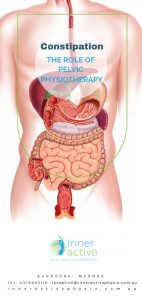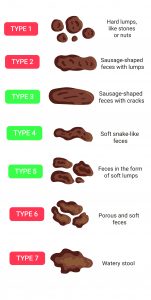
The digestive system & constipation
To help you to understand how to manage constipation, we first take a look at the digestive system. The digestive system includes the gastrointestinal (GI) tract, along with three other organs, the liver, pancreas and gallbladder. The GI tract itself is a series of hollow organs that are connected to each other from mouth to anus. Food travels through the following organs:
- mouth – breakdown of food begins here with carbohydrates
- oesophagus – food travels from mouth and stomach
- stomach – further breakdown occurs plus absorption
- small bowel – final phase of breakdown, nutrient absorption & fluid exchange
- colon – processing of the digestive waste material
- rectum – product storage until the right time
- anus – product removal
Apart from the many factors you will likely have heard about, CONSTIPATION may relate to incorrect use of the pelvic floor & abdominal muscles (dyssynergia) when you use your bowels. Additionally, the pelvic floor may be damaged over time, through repeated straining. Such damage often leads to leakage, which tends to worsen as we age. Constipation is a common problem, especially in industrialised countries. It is defined as having less than 3 normal bowel movements per week. Stools are usually hard, dry and difficult to pass.
So what is normal when it comes to bowel function?

- Passing stool anywhere from 3 times daily to once every 3 days
- Passing stool easily, no strain involved
- Stools are soft and formed Type 3 to 5
- There is a feeling of being completely empty – “satisfied”.
- The action is pain free.
Constipation a sign of some degree of ill-health. The causes of constipation can be quite varied and complex, and if the problem is ongoing, more serious problems may develop. It is therefore important to work with your health care team to find out what is going on, in order to restore greater comfort in your life as well as better health.
Treatment
Treatment will depend on the causes we identify, so we take a thorough history in order to provide you with the best management plan in your particular case. Management may involve some or all of the following:
- * Teaching you the right way to use your bowels (muscular co-ordination, posture & breath)
- * Checking the condition of your pelvic floor (either manually and/or using diagnostic ultrasound)
- * Addressing any other muscle/joint tightness or weakness that may be contributing to the problem
- * Helping you respond appropriately to bowel signals and to establish a suitable routine.
Depending on your problem, other factors we address at Inner Active Physio may include:
- * Diet (general advice) & hydration
- * Therapeutics to improve stool consistency
- * How to integrate therapeutics into your program
- * Conditioning exercise
- * Specific exercises targeted to stretch pelvic structures
- * Bowel massage
- * Specialised exercises to promote movement (peristalsis) of the bowel contents
- * Reduction of local & generalized tension through relaxation training.
Our service includes a letter to your referring doctor and GP (if you were referred by a specialist) as well as progress reports should you attend over a longer period.
Inner Active Pelvic Physiotherapy – Who we are
Located in the northern suburbs of Melbourne, our clinic is dedicated to helping men, women & children get back to doing the things they love. We specialize in pelvic health and musculoskeletal rehabilitation, offering a holistic approach in patient care. Services extend from individualized treatments to small group exercise classes including conditioning, Pilates, stretch and restore classes. If you would like to know how we can help you with your bowel concerns , please contact us HERE
* Costs apply for all consultations
Private Health rebates may apply if you have extras cover for physiotherapy
Eligibility for a Care Plan which partially covers costs, may apply. Please speak with your doctor.
References
‘Assessment of normal bowel habits in the general adult population: the Popcol study.’ Walter SA et al 2010 Walter S.A., Kjellstrom, L., Nyhlin, H., Talley, N.J. and Agreus, L. (2010) Scan J.
Gastroenterol 45(5):556-566
‘Female Bowel Function: The Real Story.’Zutshi, M., Hull, T.L., Bast, J. and Hammel, J. (2007) ‘Female Bowel Function: The Real Story.’ Dis Colon Rectum 50(3):351-358
‘Understanding the physiology of human defaecation and disorders of continence and evacuation’ Heitmann, P., Vollebregt, P., Knowles, C., Lunniss, P.; Nature Reviews Gastroenterology & Hepatology 18(Suppl. 2) August 2021DOI:10.1038/s41575-021-00487-5





